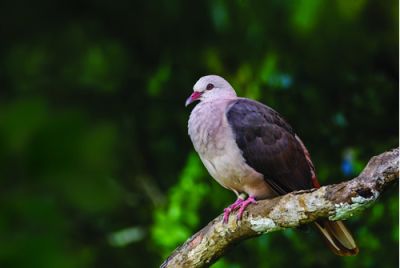Pink Pigeon Recovery: A Conservation Success Story
In honor of World Endangered Species Day, the Gerald Durrell Endangered Wildlife Sanctuary (GDEWS) in Mauritius celebrated its work to save the Pink Pigeon. This rare bird species, native to Mauritius, has faced the serious threat of extinction due to habitat loss, disease, and predators. Captive breeding has emerged as a vital method to preserve Mauritius’s rarest birds, especially the endangered Pink Pigeon.
In this conservation approach, GDEWS relocates wild Pink Pigeons into a safe, controlled environment. Here, these birds are protected from outside dangers like predators and poaching, which disrupt breeding in natural habitats. This protected setting offers the Pink Pigeons greater breeding success than what they experience in the wild. The captive population serves two essential purposes. First, it acts as a protective measure against sudden population losses in the wild, which could endanger the species further. Second, it provides birds that can be reintroduced to their natural habitats as part of efforts to restore native ecosystems.
Through expert management of food, health, and overall safety, GDEWS has achieved remarkable success with these breeding programs. The team maintains a precise balance of care, ensuring the birds are healthy and able to thrive under protection. The captive Pink Pigeons serve as a lifeline for the future of the species, with each new bird marking a step toward recovery. The consistent efforts of GDEWS staff demonstrate dedication and specialized knowledge, critical in overcoming the challenges involved in species restoration.
By following this carefully controlled breeding plan, GDEWS has restored hope for the Pink Pigeon population, making this conservation a success story. Their ongoing efforts inspire a broader conservation movement to save endangered species. Mauritius’s native Pink Pigeon now has a brighter outlook, promising a future where it can again thrive in the wild.



